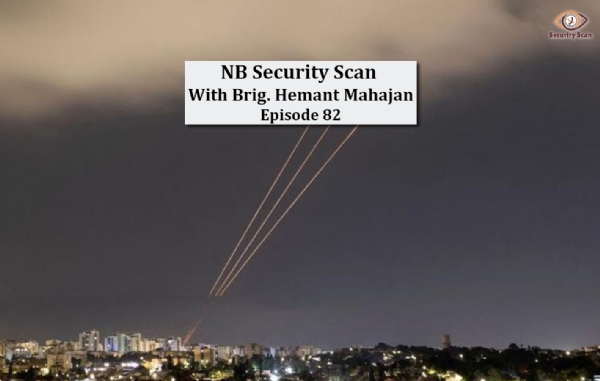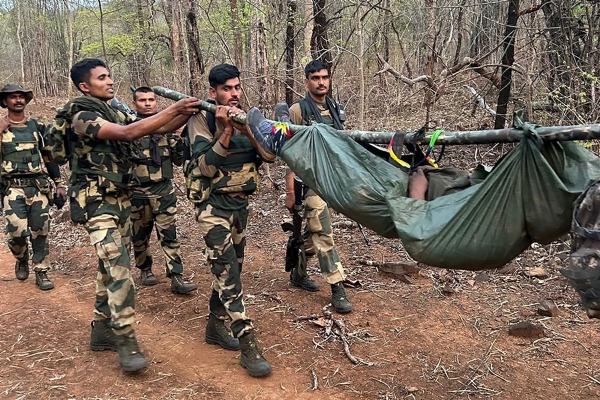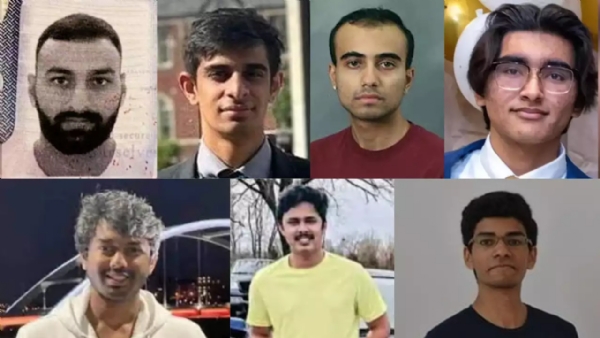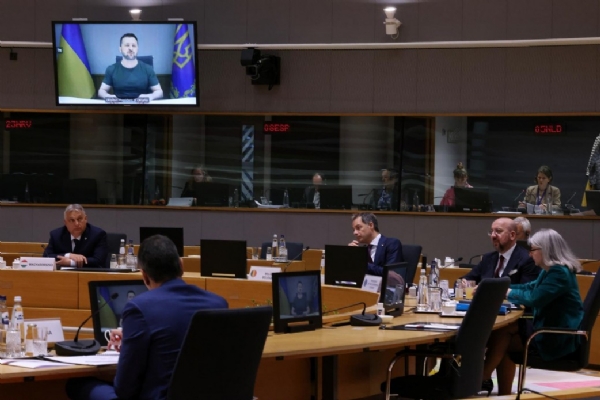#SecurityScan 82: Chinese involvement in Iranian Missile, Drone Assault on Israel & much more
24 Apr 2024 13:05:56
This article is a summary of important events that have taken place in last one week affecting, India's national security .
#COUNTERING CHINESE MULTI DOMAIN , GREYZONE, HIGH BREED WARFARE
Chinese Hand Evident in Iranian Missile and Drone Assault on Israel
Iran's recent attack on Israel, utilizing missiles and drones, showcased a significant Chinese influence in its weaponry. This assault, however, was effectively countered by a joint effort from Israel, the US, and the UK, resulting in the interception of 99 percent of the 300 projectiles launched.

The response to Iran's attack was facilitated by long-standing surveillance efforts by the US and UK, who have meticulously monitored China's military advancements over the years. This vigilance enabled them to anticipate the capabilities of the "kamikaze" drones employed by Iran and predict the trajectories of the ballistic missiles.(Lessons for India)
Key Indicators of Chinese Involvement:
China has been a prominent supplier of military equipment to Iran, including anti-ship missiles, cruise missiles, fighter jets, tanks, and anti-tank guns.
It played a pivotal role in bolstering Iran's missile technology following the Islamic Revolution in 1979, transferring crucial guidance systems and providing technological support.
The "Shahed" armed drone, utilized in the recent attack, features an engine manufactured by Beijing Micropilot UAV Flight Control Systems, a clear indication of Chinese involvement.
Furthermore, Iran's largest missile production facility near Esfahan owes its existence to China's assistance, highlighting a longstanding collaboration in missile development.
The interception of Iranian missiles and drones involved a sophisticated defense network deployed by Israel, supported by US ground stations in West Asia, fighter jets, and naval vessels stationed in the Mediterranean Sea. The precision-guided weaponry utilized by Iran bore the mark of Chinese technology, with components sourced from leading Chinese manufacturers.
China's Role in Missile Development:
Components used in Iranian missiles were traced back to three Chinese companies: Wuhan IRCEN Technology Co Ltd, Raybeam Optronics Co Ltd, and Sunway Tech Co Ltd.
These companies supply crucial parts to Iranian entities such as Rayan Pardazesh Pezhvak Company, Rayan Laser Test Company, and Rayan Electronic Farda Company.
China's contribution extends beyond mere exports, as it has provided training and technology for the construction of missile production facilities in Iran.
The collaboration between Iran and China in missile development dates back several decades, with China's expertise playing a significant role in enhancing Iran's military capabilities. This shows Chinese approach to become a super power at all costs.
Successful Trilateral Summit Between The United States, Japan And The Philippines
The first of its kind trilateral summit between the United States, Japan and the Philippines took place at Washington DC on April 11, 2024, with the purpose of deepening the economic and security cooperation between the three countries. This meeting was hosted by the US amidst the growing tensions between the Philippines and China around the Second Thomas Shoal in the disputed waters of the South China Sea.
In late March this year, two China Coast Guard vessels used high-pressure water cannons on a Philippines resupply vessel en route to Second Thomas Shoal, severely damaging the ship and injuring two Filipino sailors.
The statement however, which has drawn the most attention of policy analysts all over has been US President Biden’s statement ,“The United States’ commitments to the defense of Japan and the Philippines remain ‘ironclad’, and any attack on Philippine aircraft, vessels or armed forces in the South China Sea would invoke our mutual defense treaty." The three countries agreed on a flurry of defense, security and economic initiatives, including joint naval patrols, increased coast guard cooperation and large infrastructure projects.
Towards contributing to the maritime capacity building of the Philippines, Japan and the US have agreed to the establishment of a trilateral maritime dialogue to enhance coordination and collective responses to promote maritime cooperation. The US has also invited the Filipino and Japanese coast guard members to join an US coast guard during a trilateral patrol in the Indo-Pacific. Tokyo and Manila are slated to conclude the signing of the Reciprocal Access Agreement by the end of the year.
Countering Internal & External Security Challenges
Security Forces Neutralize 29 Naxals in Chhattisgarh Jungles
In a significant blow to Naxal insurgents, security forces executed a major operation resulting in the elimination of 29 extremists in the dense forests of Kanker, Chhattisgarh. Among the casualties was senior commander Shankar Rao, who carried a bounty of Rs 25 lakh. A substantial cache of weapons and ammunition was seized during the operation.

The security forces received intelligence pinpointing the presence of high-ranking cadres like Lalita, Shankar Rao, and Raju in the region spanning between Abujhmad, Gadchiroli district in Maharashtra, and north Bastar. Acting swiftly, a joint team comprising District Reserve Guards (DRG) and Border Security Force (BSF) was deployed to the area.
Following the intense two-hour confrontation, confirmed the demise of 29 Naxals, including high-profile figures like Shankar Rao and Lalita. Three security personnel sustained injuries during the engagement and were promptly airlifted to Raipur for medical attention.
Chhattisgarh Chief Minister Vishnu Deo Sai applauded the joint efforts of the DRG and BSF, highlighting the operation's pivotal role in ensuring security ahead of the upcoming Lok Sabha elections. He reiterated the government's commitment to curbing Naxalism and fostering development in affected regions.
The Way Forward
Government data underscores a concerted push towards eradicating the Naxal menace, coupled with initiatives aimed at socio-economic development in affected areas. Analysts attribute the decline in Naxal-related incidents to the combined effect of strategic actions by the state and the waning influence of Naxal ideology.
India's Strategic Move: Partnering with NVIDIA to Bolster AI Capabilities
The Indian government is taking decisive steps towards enhancing the nation's AI infrastructure by contemplating a groundbreaking deal with NVIDIA, a leading chip-making giant. Valued at Rs 10,000 crore, this prospective collaboration aims to provide access to NVIDIA's cutting-edge GPUs and Neural Processing Units (NPUs) to Indian startups, research institutions, and academic bodies at subsidized rates, thereby fueling innovation in the AI sector.
Exploring Models for Acquisition
India is exploring two primary models for the acquisition and distribution of AI-capable NPUs and GPUs: a "rent-and-sublet" model and a marketplace model. Under the former, qualifying entities would receive GPUs on concessional terms directly from the government. Alternatively, the marketplace model encourages direct negotiations between companies and NVIDIA, with incentives tied to performance gains, akin to India's Production-Linked Incentive (PLI) scheme.
Addressing the Challenge of Scarcity and Cost
The scarcity and exorbitant cost of GPUs pose significant hurdles, particularly for startups. NVIDIA's top-tier H100 GPUs, priced at $50,000 each, and the Blackwell cards, priced at $40,000, underscore the financial barriers hindering access to essential computing resources. To put this into perspective, developing and training large AI models may require thousands of GPUs, a substantial investment for any organization.
Striving for Competitiveness
India's aspiration to remain competitive in AI research and development is evident through initiatives like the AI Mission, backed by a substantial allocation of Rs 10,372 crore. With plans to deploy 10,000 GPUs through public-private partnerships, India aims to bridge the gap in computing capabilities compared to global leaders in the AI space.
Navigating Global Dynamics
Navigating global dynamics in GPU acquisition requires strategic engagement with stakeholders and optimized approaches. While GPUs are acquired by both companies and government agencies globally, India's federal structure necessitates innovative solutions to secure access to these critical resources.
Driving Innovation and Sovereignty
The burgeoning demand for GPUs underscores their pivotal role in driving innovation and safeguarding the sovereignty of Indian data. Collaborations between Indian conglomerates and NVIDIA signify a collective effort to harness AI capabilities domestically, reducing reliance on foreign cloud resources and bolstering India's standing in the global AI landscape.
India's potential partnership with NVIDIA represents a seminal moment in its quest to bolster AI capabilities domestically. By fostering accessibility to advanced computing resources, India aims to unleash the full potential of its burgeoning AI ecosystem, driving innovation, competitiveness, and sovereignty in the digital age.
Ensure Security of Indian Students in the USA
In recent weeks, the United States has witnessed a concerning spike in the deaths of Indian or Indian-origin students under suspicious circumstances. This alarming trend suggests that the Joe Biden administration is not taking sufficient measures to address these attacks. Just recently, Mohammed Abdul Arfath, a 25-year-old student from Hyderabad, was found dead in Cleveland after being missing for several weeks. His family had even received a ransom call on March 17. Tragically, similar incidents have occurred, including the death of Uma Satya Sai Gadde in Ohio last week and the shooting of Amarnath Ghosh, a trained classical dancer, in St. Louis, Missouri, in March.

The series of unnatural deaths in January and February prompted John Kirby, a White House communications officer, to emphasize that there is no excuse for violence based on race, gender, religion, or any other factor. He assured the Indian diaspora that the Biden administration was working diligently to prevent such attacks. Similarly, US Ambassador to India . However, the situation on the ground appears to be worsening.
The Foundation for India and Indian Diaspora Studies, based in the US, has identified the main causes behind these incidents, which include violent crimes, suspicious accidents, and mental health issues leading to suicide. The foundation has urged authorities to raise awareness about the various risks and provide mental health support. There are speculations that negative propaganda against the Indian community is fuelling hate crimes.
Indians comprise approximately 25 percent of foreign students in the US. It is imperative for America to prioritize their safety and take strong action against the perpetrators of hate crimes.
By taking proactive steps to safeguard Indian students and cracking down on hate-mongers, the United States can uphold its commitment to inclusivity, protect its reputation, and foster a safe and welcoming environment for all students.
Indian Military Diplomatic Outreach: Plans To Dispatch Defence Attachés To Key African Regions
India is amplifying its military diplomacy endeavors, with a keen focus on bolstering engagement in Africa and other vital regions worldwide.
"India's decision to deploy defence attachés in Mozambique, the Ivory Coast, and the Philippines marks a pivotal step in enhancing our defence cooperation with these nations.
India will also post defence attachés for the first time to Poland, and to Armenia, with which the Indian side recently concluded a big-ticket arms deal.
These postings will reinforce India's presence in key regions and pave the way for greater military collaboration.
India plans to appoint a defence attaché in Ethiopia after several decades, along with the deployment of a new military attaché to Djibouti.
"These postings signify India's keen interest in strengthening defence ties with countries aiming to modernize their armed forces," emphasized the official.
In tandem with its African outreach, India is establishing 18 new missions on the continent as part of the external affairs ministry's broader strategy.
"These developments underscore India's commitment to fostering robust security partnerships and advancing its national interests on the global stage.
India is also streamlining its military presence in countries like Russia and the UK, reallocating resources to nations witnessing increased defence cooperation.
WORLD AT WAR:LESSONS FOR INDIA
Israel's Use of AI Tools to Target Hamas in Gaza
Israel's utilization of a state-of-the-art AI-based software called "Lavender" in its ongoing conflict with Hamas in Gaza has shed light on this technological advancement.The Israel Defence Force (IDF) has employed a tool called "Lavender" to generate a list of potential Hamas targets in the Gaza territory.
Another AI-based software, known as "Where's Daddy?", has been used to alert the IDF as soon as the target identified by "Lavender" enters their home, prompting Israeli airstrikes on those locations.
This development highlights the significant progress made in AI technology, in real-time warfare conditions.
"Lavender" earlier versions were first employed in May 2021 during Israel's operation against Gaza, where the AI system was used to identify Hamas missile squad commanders.
Over time, the system expanded its capabilities, enabling it to generate tens of thousands of potential targets in mere seconds or minutes, a task that would have taken humans days or weeks to accomplish manually.
To train "Lavender," a vast amount of intelligence data collected through mass video surveillance and other means was utilized. The AI algorithm sifted through this data to identify traits associated with Hamas terrorists.

The machine was trained to recognize patterns such as frequent changes in phone numbers or addresses, usage of phones previously flagged as belonging to Hamas operatives, or membership in WhatsApp groups known to include Hamas operatives.
If an individual closely resembled these patterns or traits, the AI would flag them as potential targets.
The data identified by "Lavender" is then passed on to another AI system, "Where's Daddy?", which promptly notifies the military once the target. Subsequently, the Israeli Air Force carries out airstrikes to neutralize the target, which was 90 percent accurate.
However, there were instances where the system proved to be inaccurate. Innocent civilians, civil defense workers, and relatives of Hamas operatives were mistakenly flagged as legitimate targets, leading to the erroneous bombing of civilians.
Despite these errors, the system has allowed the IDF to be highly effective and ruthless. The Israel Air Force conducted an unprecedented number of airstrikes during the initial phase of the war, made possible by AI.
The United States, China, are developing of such capabilities or have already implemented them. Hence India should start developing and deploying AI-based technologies.
Prevent Escalation of Conflict between Iran and Israel
In a concerning turn of events, Iran launched a missile and drone attack on Israel on Saturday night, a move that has materialized the world's worst fears since the October 7 attack on Israel by Iran's ally, Hamas. Only two weeks prior to Iran's attack, Israel had conducted a bombing on the Iranian consulate in Damascus, resulting in the death of a high-ranking General from the Islamic Revolutionary Guard Corps and several military advisors.
Iran recently seized an Israel-affiliated cargo vessel, which includes 17 Indian nationals among its crew of 25. Israel, with support from the United States and other allies, claims to have successfully intercepted and thwarted Iran's attack. Despite this, the bombardment caused injuries to more than 10 individuals, and inflicted minor damage to an airbase.
Following the April 1 bombing, Iranian leadership had vowed to seek revenge, with Ayatollah Ali Khamenei specifically stating that Israel would face punishment. Having now demonstrated their capability to strike deep into Israeli territory, Iran's Permanent Representative to the UN announced on Sunday that their retaliation had concluded. Iran also issued a warning to Israel, urging them not to respond. In response to these developments, Israel's allies, including the United Kingdom and France, have reaffirmed their commitment to safeguarding Tel Aviv.
It is crucial that these allies unite their efforts to dissuade Israeli Prime Minister Benjamin Netanyahu from launching a strike on Iran, as such an action could potentially trigger a full-blown war in West Asia.
India, which maintains good relations with both Iran and Israel, has been advocating for restraint. Its immediate priority should be the safe evacuation of its nationals, including the ship crew and recently migrated laborers, from an impending war zone.
While the arms industry in Europe, the United States, and China might stand to benefit from such escalation, it is the responsibility of conscientious individuals and nations to work tirelessly towards bringing peace to West Asia.
Ensure Russia's Participation in Ukraine Peace Talks
Switzerland has recently announced its intention to host an international conference in June, aiming to facilitate a high-level dialogue on achieving a comprehensive, just, and lasting peace for Ukraine based on international law and the UN Charter. Leaders from major Global South countries, including India, as well as Western nations, have been invited to participate. While Ukrainian President Volodymyr Zelenskyy has confirmed his attendance, his Russian counterpart, Vladimir Putin, has expressed disdain for the scheduled peace talks.

Putin has warned that Moscow will not accept any enforced plans that disregard Russian interests and has claimed that Russia has not even been invited to the conference. He retorted, "They think there is nothing for us to do there, but at the same time they say it's impossible to decide anything without us." Additionally, Russian Foreign Minister Sergey Lavrov has dismissed the meeting as a Western tactic to garner broader international support for Kyiv.
It is evident that any viable peace plan for Ukraine necessitates the participation and consent of Russia. Putin has already rejected Zelenskyy's proposed formula, which involves Moscow's troop withdrawal, payment of compensation to Ukraine, and facing an international tribunal for alleged crimes. The Western-led attempt to take the initiative through the Swiss talks runs the risk of being counterproductive and further prolonging the three-year-long war that has caused global disruptions in supply chains.
Switzerland, which has emphasized that "peace is at the heart of the Swiss spirit," bears the responsibility to make every effort to bring Russia to the negotiating table. Additionally, it is imperative to involve influential actors like China in the peace talks. India, regarded as a potential mediator due to its positive relations with both warring nations, must play a proactive role in preventing the June summit from becoming a failure and devolving into a mere display of Western strength.
--